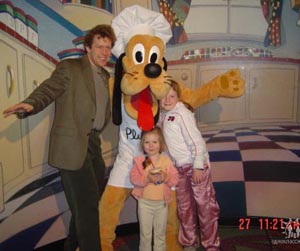Born and raised in Moscow, Nicholas Kotov had traveled quite a bit before becoming a Professor at the University of Michigan. Nicholas Kotov loves science and works on ways to correct vision problems by making nanoscale materials such as carbon nanotubes that can interact with neurons responsible for sight!.
Tell us a bit about your background.
I grew up in Russia, when it was still the big almighty Soviet Union. We lived in Moscow and it was better than is often portrayed in media although my family had very modest means. Most of my family members were in science or medicine. I still remember that on the night stand of my mom and dad there was a book on electron spin resonance of free radicals. I felt very much encouraged to go into inventions and science.
As everybody, I had both good and bad teachers. Those which were good tend to be stricter and more demanding than the other type.
When I was growing up, I had a big issue with stuttering especially in school. When you are a kid this is a huge problem. When you are adult, this does remain a problem but I learned to focus on what is important to me and go for it regardless. Quite often our weaknesses are our excuses not to try. This is wrong.
My mother was telling me that you may not be the best and smartest in the class but those who succeed are those who have a good deal of persistence. It turns out to be true. The person needs to be tough and humble.
What was your first impression when you came to the United States?
My first impression about the USA was that of downtown of NY City. I had a few hours before the bus to walk around the 42nd Bus Terminal on Manhattan. This place was pretty crazy at that time. Nothing like what I expected. To start nobody spoke the perfect English there.
How did you come to your current job?
I love science. I want to do something for the mankind. I followed what I wanted to do and the job found me. It is much easier this way. Geographically coming to this current job involved a bit of travel. Initially I moved from Moscow, Russia to Syracuse, NY, then to Stillwater, OK, and then to Ann Arbor, MI. It is fun to travel and to change places. Keeping you away from getting too comfortable.
When you were a kid did you run around and do science?
Yes I did. I was interested in chemistry and as many kids enjoyed blowing things up. Not that I can advocate it now. It did give me an introduction to safety and I still have small scars from that period. After that I was more interested in life and living cells.
Right now you are working on?
I have many projects now. They all come under one umbrella of organization of matter at nanoscale. My know how to control structure of atoms at angstrom scale. Same for structural elements and devices at micrometer scale. But nanoscale is a different beast. We need to learn from cells and biology how to do it.
You work on potential ways to help correct problems with vision, can you tell us a bit about this?
This is one of the projects, one of the far-fetched ones. My students and I are developing methods to interface with neurons responsible for transport of visual information. The materials that are needed for that have to have many advanced properties such as strength, high conductivity, biocompatibility, and also being quite thin to resemble the retina. We think that carbon nanotubes can be quite useful for that because they have many of these properties. The challenge is to make the actual macroscale materials from them that display these properties, too.
Some of your work seems almost science fiction—do you think about doing things that might give people super powers?
Of course! Would not that be wonderful! The superpower I favor in particularly is flying but don’t know how to make it happen. The one which is more realistic is infrared vision.
Wow then you would be able to see in the dark?
Absolutely, no more stumbling over the chairs at night.
How long until you think this work might have some practical use?
In principle it can be realized within 10 years. It depends how much need this ability presents. You see, this is not something that you can realize in your garage. A lot of people and a lot of effort need to be put in it to make it happen. Sometimes we need to make a choice what do we want to spent the time on: curing the cancer, making stronger car, or .. infrared vision.
If you weren’t a scientist what do you imagine you might be doing?
I kind of like the idea of being a drummer in a rock band. You don’t want hear me singing, though.

